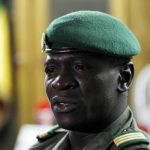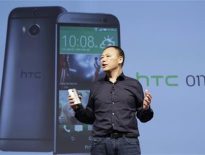(Reuters) – U.S. President Barack Obama brought together the leaders of Japan and South Korea for their first face-to-face talks as a North Korean ballistic missile launch underscored the need for Washington’s two key Asian allies to repair their strained ties.

REUTERS/Kevin Lamarque (NETHERLANDS – Tags: POLITICS)
Washington hopes the three-way summit will improve relations between Seoul and Tokyo, which are clouded by the legacy of Japan’s 1910-1945 colonial rule of the Korean peninsula and Seoul’s concerns that Prime Minister Shinzo Abe wants to rewrite Japan’s wartime past with a less apologetic tone.
The United States wants to strengthen the allies’ combined response to regional concerns such as North Korea’s banned weapons programs and China’s growing assertiveness in disputed waters.
In what appeared to be a show of defiance, North Korea fired two medium-range Rodong ballistic missiles into the sea at 2:35 a.m. Japan and Korea time, both Tokyo and Seoul said. That was precisely when Abe and South Korean President Park Geun-hye were sitting down with Obama in The Hague for their first meeting since Abe took office in December 2012.
North Korea’s first firing in four years of mid-range Rodong missiles that can hit Japan followed a series of short-range rocket launches over the past two months and could help improve cooperation between Tokyo and Seoul.
In Seoul, South Korean Defence Ministry spokesman Kim Min-seok called the launches a clear violation of U.N. Security Council resolutions and a grave provocation against South Korea and the international community.
Japan and the United States also protested the launches.
But Tokyo’s plans to resume high-level talks next week with Pyongyang on Japanese citizens abducted by North Korea decades ago, as well as the North’s missile and nuclear programs, would not be canceled, Japanese Chief Cabinet Secretary Yoshihide Suga said.
Those talks have been suspended since December 2012.
SIGNAL TO PYONGYANG
Park, Abe and Obama, who met on the sidelines of a nuclear security summit in the Hague, emphasized the need to work together on containing the North Korean nuclear threat.
Over the last five years, close coordination between our three countries succeeded in changing the game with North Korea: our trilateral cooperation has sent a strong signal to Pyongyang that its provocations and threats will be met with a unified response, said Obama, who will visit Japan and South Korea next month.
In an apparent attempt to break the ice with Park, Abe addressed the South Korean leader in Korean at the start of the talks, saying he was very happy to be able to meet her.
But the summit left aside thorny disputes over wartime history, such as the issue of women, many Korean, forced to work in Japanese military brothels before and during World War Two.
The festering problem of history has kept the U.S. allies from deepening military cooperation despite rising regional tensions.
Obama said the three leaders discussed specific steps to deepen trilateral coordination, including military cooperation that includes joint exercises and on missile defence.
Japanese public broadcaster NHK later quoted a White House official as telling reporters that talks among senior defence officials from the three countries would take place soon.
HISTORY STILL RANKLES
Abe has visited all 10 Southeast Asian countries and met with their leaders and also met five times with Russian President Vladimir Putin, but had not met with Park since becoming premier. Nor has he had a summit with Chinese President Xi Jinping since the two took office.
Tokyo’s ties with Beijing are strained by a territorial row over tiny Japanese-controlled islands in the East China Sea as well as bitter Chinese memories of Japan’s past militarism and Japan’s suspicions towards China’s military build-up.
The Japanese leader’s December visit to Tokyo’s Yasukuni Shrine, seen by critics as a symbol of Japan’s wartime militarism, upset not only China and South Korea but also the United States, which expressed disappointment.
In a sign that history would continue to rankle, Park thanked Xi at a meeting near The Hague on Sunday for building a memorial hall in China honoring a Korean who assassinated a Japanese official more than a century ago, Chinese media said.
Japan has protested the memorial to Ahn Jung-geun, who in 1909 killed Hirobumi Ito, a former top Japanese official in Korea, which was then occupied by Japan. Ito was killed in the northeastern Chinese city of Harbin, the site of the memorial.
Korea sees Ahn as a hero who fought for independence; Japan has branded him a terrorist.
North Korea’s launch on Wednesday of the Rodong missiles coincided with annual South Korean-U.S. military drills and the fourth anniversary of the sinking of the South Korean navy ship the Cheonan. Seoul blames North Korea for that attack but Pyongyang on Wednesday again denied any role, saying in a commentary the accusation was a farce.
A South Korean official said the missiles fell into the sea after flying 650 km (400 miles), well short of their maximum range – thought to be some 1,300 km (800 miles).
(Additional reporting by Ju-min Park and Jack Kim in Seoul, Steve Holland in The Hague and Nobuhiro Kubo, Stanley White and Kaori Kaneko in Tokyo; Writing by William Mallard and Linda Sieg; Editing by Dean Yates)





